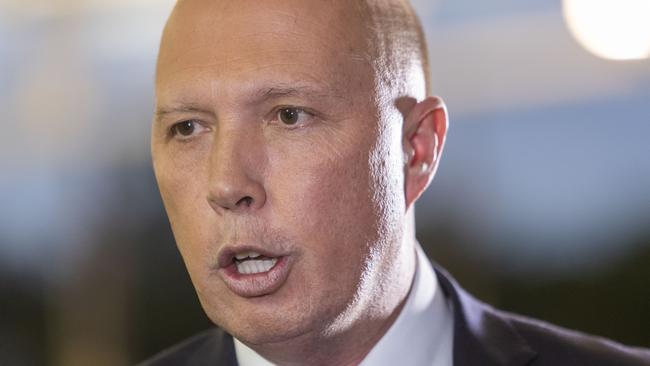Coalition in urgent bid to prevent medi-flood
The Morrison government will move swiftly to try to repeal medivac laws when parliament returns next month.

The Morrison government will move swiftly to try to repeal the medivac laws when parliament returns after the Federal Court ruled yesterday that refugees and asylum-seekers could seek medical transfer to Australia without having to speak directly to assessing doctors.
The Coalition is also considering an immediate High Court challenge to the ruling that Home Affairs Minister Peter Dutton said had further weakened laws and could open the “floodgates”.
The judgment in a case brought by a young Iraqi man seeking to overturn the government’s refusal to approve a medical transfer from Nauru where he has been for six years, means that two assessing doctors need only review a medical file to approve a medical transfer to Australia.
The Department of Home Affairs argued that the medivac laws required a personal interview or personal engagement with the patient before a transfer could be approved. This was rejected by the court.
Mr Dutton said the ruling would mean immediate challenges to at least 10 cases of request for transfer, which had been ruled invalid. “This is a mess entirely of Labor’s making,” Mr Dutton said. “Anthony Albanese should acknowledge this and vote with us to repeal this dangerous piece of law. They voted for this law not having any idea of the consequences. The Australian people voted for the Coalition because we keep the borders secure and we will be abolishing this bill or the boats will restart.”
Labor yesterday welcomed the ruling, saying it would give certainty to asylum-seekers and refugees seeking to use the laws for urgent medical treatment in Australia. Labor would oppose any attempt to repeal the legislation.
Opposition home affairs spokeswoman Kristina Keneally said the decision did not change the minister’s ability to deny an application on health, security or character grounds.
“The government has cried wolf on medivac before, and they’ll cry wolf again now,” Senator Keneally said.
“Medivac laws ultimately provide the minister with absolute discretion as to who comes into the country, and the minister is ultimately responsible for how many people arrive in Australia.
“This decision does not change the role of the Independent Health Advice Panel, which has already rejected more applications than it has approved, showing that it is working properly.”
In the first Federal Court test of the laws introduced and passed by Labor and the crossbench and vigorously opposed by the Coalition in the lower house in February, judge Mordecai Bromberg rejected the Department of Home Affairs’ argument that the law contained an implicit requirement that the two doctors carrying out a remote assessment must have personal engagement with the patient
The 29-year-old Iraqi man who brought the case arrived in Australia in 2013 and was sent to Nauru. He applied for medical transfer to Australia on May 3 this year and again on May 17 and was rejected by the Department of Home Affairs on the basis the assessment by doctors Alvaro Manovel from Prince of Wales Hospital in Sydney and Michael Dudley from the University of NSW was not valid as it did not include “personal” interaction with the patient and relied only on a review of medical records.
Justice Bromberg rejected this interpretation. “Each of Drs Manovel and Dudley formed their opinions and prepared their reports on the basis of having reviewed the applicant’s medical records and other material relating (inter alia) to medical facilities on Nauru,” he said in his written judgment dated June 18. “Neither of the doctors personally interviewed or physically examined the applicant or otherwise personally engaged with him.
“The (Home Affairs) Secretary contended that the assessments of the applicant made by Drs Manovel and Dudley are not assessments within the meaning of s 198E (7)(b), because of the absence (in each case) of any personal interaction or engagement with the applicant in the conduct of the assessment.
“The use of the word ‘remotely’ as an alternative to the phrase ‘in person’ in s 198E (7)(b), confirms that the word is dealing with proximity in terms of distance. It connotes that what is being assessed need not be co-located with the assessor or the place of the assessment.”
While the current law requires medical transferees to be returned to Nauru after treatment, the government has no power to return them forcibly and claims the majority of those transferred sought to stay permanently once arriving in Australia and had accessed legal services to challenge any attempt to be returned.
Since the medivac laws were passed, 22 people have been transferred to Australia from Nauru for temporary treatment, with another eight having been approved and awaiting transfer.
The government has argued that many of the medical cases were minor and the system was being used as a path to permanent settlement in Australia.
The government may struggle to repeal the laws, as it needs the support of four Senate crossbenchers to pass legislation in the face of Labor and Greens opposition. A spokesman for One Nation senators Pauline Hanson and Malcolm Roberts said they would likely support repealing the legislation, as would conservative Cory Bernardi.
However, Centre Alliance senators Rex Patrick and Stirling Griff would oppose any move to kill off the laws. This would leave the fate of the medivac laws in the hands of re-elected independent Jacquie Lambie, who has refused to reveal her hand.



